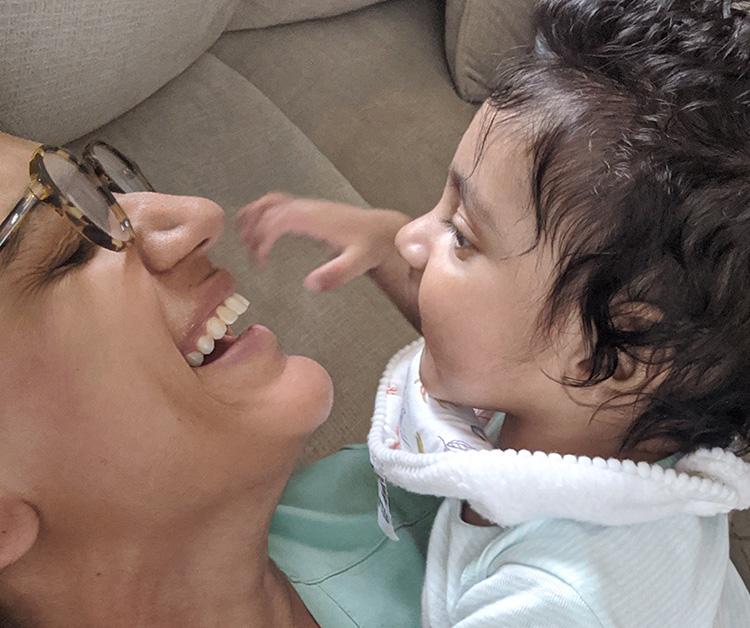Due to maintenance, rewards points for receipt uploads will be delayed. Thank you for your patience!

Pediatrician and infant development expert, Dr. Mona Amin, dives into the concerns parents have when their child isn’t meeting baby development milestones, what that means and how parents should respond. Milestone anxiety is not uncommon in new parents and Dr. Amin is here to combat it.
As a Pediatrician and mom, my role is to help parents understand everything I can about their child’s health. This can include topics like feeding, sleep, baby development, and child development. Over the years, I’ve noticed that certain topics cause parents more worry than others.
Infant development is equally important to the maker of Enfamil NeuroPro, because of this, I’ve collaborated with them to share insight as an infant development expert on a few topics that are important to discuss, including overcoming milestone anxiety.
As a mom myself, I have been through the ups and downs of being a mom too, and even I find myself worrying if things are okay. Mom anxiety is real: I’ve been there!
One topic that comes up a lot in my office is milestone anxiety, these are parents who are concerned about the development of their child. Sometimes it’s that they are worried their child isn’t meeting a certain milestone on time, worried that they may need intervention of some kind, or that they are not doing enough to engage with their child.
All of these worries can cause parents to feel like they’re not doing a great job with their child. Milestone anxiety can cause problems for a few reasons:
When looking at baby development milestones, parents should keep in mind the following things:
The milestone age is supposed to be used as a reference to guide when we would expect that activity by and meeting it later isn’t always a cause for concern.
Let’s use child development milestones for example: at 18-months, we hope that a toddler would have at least 10 words. That’s the milestone. However, if a child has 5 words, we are looking at the big picture for that child. Are they meeting other milestones such as pointing, waving, babbling, or signs that they understand commands? These are important tools in the foundation of speech and can tell us that language is coming. If an 18-month-old has only 5 words, a conversation is had with the child’s clinician looking at the overall development.
Many parents worry that if their child isn’t meeting a certain milestone that they will be recommended to see a physical therapist, occupational therapist, or speech therapist. When looking at development, remember that we want the best trajectory for the child in front of us. This isn’t a comparison with other children. Every child is unique and will meet certain milestones on their own time. Some may need assistance, and this is to be celebrated. We use milestones as a guide to help the child and their parent by giving them the best intervention possible. If a child isn’t speaking, we want the child to get resources from a speech therapist to meet the best outcome possible for them to be able to communicate. This communication may look different depending on the diagnosis of speech delay, but it will only benefit the child and family to get the early intervention they need.
You are a great parent regardless of what your child is accomplishing in terms of milestones. One of the goals of milestone education is to teach parents how to engage with baby month-by-month, but also what to monitor when it comes to concerns. It’s important to look at the big picture of your baby. The big picture takes into account all development areas: social/emotional, language/communication, cognitive/learning, and motor/physical. It looks at how each development area thrives, but also how it relates to another. If we are concerned with one area, we ask ourselves: “Is this child showing other positive milestones in other areas that they will reach that milestone." For example, if a child is not speaking (a language/communication milestone), but is showing a cognitive skill of being able to follow commands, this can be reassuring that spoken language is coming.
When looking at development, I encourage you to truly focus on the child in front of you. When we compare our children to what other children are doing, we get into a race to reach a milestone which can negatively impact our interactions with our child.
I often find parents so stressed about their child’s development that they lose the joy of playing with them. They are so obsessed with them learning words, that they forget to sit-back and engage with them in a way that fosters their development.
That is why addressing milestone anxiety is so important: to remind parents that they are doing a great job, educate them about baby development in a big picture, and empower them to seek medical attention if they are concerned about their child.
Once parents acknowledge this, to further alleviate stress, they can begin participating in play therapy which offers the opportunity to support baby’s development and provide relationship building between parents and their children.
Know that, at the end of the day, you’re doing a great job! Be confident in your parenting ability and enjoy your time with your little one.
All information on Enfamil, including but not limited to information about health, medical conditions, and nutrition, is intended for your general knowledge and is not a substitute for a healthcare professional's medical identification, advice, or management for specific medical conditions. You should seek medical care and consult your doctor or pediatrician for any specific health or nutrition issues. Never disregard professional medical advice or delay seeking medical treatment, care, or help because of information you have read on Enfamil.